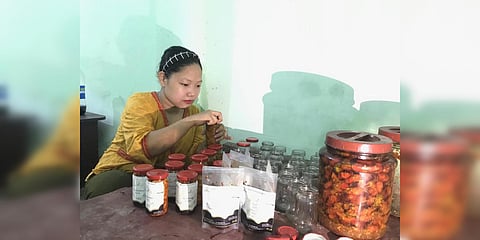

GUWAHATI: Yade Dujom is simply unstoppable: the launch of her humble pickle enterprise in Arunachal Pradesh's capital Itanagar may have gone unnoticed, but she is determined to make it a success.
Brought up by her maternal grandmother and later, ill-treated by her stepmother, Yade has managed to beat the odds against her by being always positive about a bright tomorrow. In a state that has only few woman entrepreneurs, she is today the proud owner of the Arunachal Pickle House.
The venture has helped her as well as a group of housewives, distressed by poverty, to be self-reliant. Yade hails from a small village called Lenyi in the state's Upper Subansiri district. At the age of four, she was struck by the tragedy of her mother’s death.
"My life has been full of struggles. After my mother's death, my younger sister and I were sent to our granny's house. She was all alone and she eked out a living by toiling in the field. As years rolled by and we grew up, we started helping her in the field but she died one day. I had just passed class 8 then," Yade recalls.
She has vivid memories of how their stepmother ill-treated them for four years after the two sisters had gone to stay at their father’s house following their granny's death. "We were not fed well. Even clothes were not adequately provided. After passing class 12, I went to Itanagar for higher studies and picked up odd jobs to meet my expenses," says Yade (29).
She worked as a social worker before starting her enterprise. A friend had introduced her to an NGO 'I Love Arunachal' and she started taking part in various social activities. She also briefly worked as a teacher at a private school.
"Curtailing my daily personal expenses, I started saving a small amount every month. Eventually, I got myself trained in food processing, label making and the usage of preservatives. I learnt the basics of picklemaking from some women in Manipur sometime back and later, underwent a proper training in Arunachal," Yade says.
She launched the Arunachal Pickle House on February 14 this year. Through this smallscale business, she has been able to help eight people, mostly housewives. Some of them are suppliers of raw material. "I had seen many depressed housewives. They were poor and their daily needs were not fulfilled. There were also some unemployed youth I knew. So, I wanted to do something for all of them," Yade says.
After the products are sold, she shares a part of the profit among them. She says she has plans to upgrade her business, but has not yet got the support of investors due to the pandemic. "Not every one of us can become a government servant. So, why waste your time looking for a government job when you can pursue a career in something you love and are passionate about?" she says.
She is an expert in making both vegetarian and non-vegetarian pickles. The non-vegetarian varieties are made from fish, pork, chicken, beef and mithun (bovine species) meat and the vegetarian pickles from ginger, eggplant, capsicum, potato, raddish and jackfruit.
Yade has proved her mettle in cooking too after having won the second runner-up title at a state-level culinary competition. "I can cook from authentic to Indian cuisines. So, I thought why not learn pickle-making. There are a lot of raw materials in our state, but they get wasted," she says, adding, "I am selfreliant now but the best thing in life is happiness and I am very happy. I have to take my business forward along with this group of people. They now have a purpose in life."
Gopi Angu, a government employee who has known Yade for years, says she is full of confidence and determination. "Despite going through very difficult phases in life, she was never frustrated. Not just by her stepmother, she was also ill-treated by the family of her maternal uncle when she came to stay in Itanagar," Angu says.
Teri Yajo, who has a catering business, says the the beauty of Yade’s pickle varieties is that they are authentic and have local flavour.
HELPING VIA PROFIT SHARING
Yade launched the Arunachal Pickle House on February 14 this year. Through this business, she has been able to help eight people, mostly housewives. Some of them are suppliers of raw material. After
the products are sold, she shares a part of the profit among them